Hiring an ETL Developer is a critical step in building a successful data management team. These professionals are responsible for extracting, transforming, and loading data, ensuring that your organization's data pipelines run smoothly. Many companies struggle with the technical aspects of this hire, often overlooking the importance of domain knowledge and problem-solving skills. To hire the right talent, you must identify candidates who not only possess technical expertise but also align with your business goals.
In this article, you will learn about the entire hiring process for an ETL Developer, from crafting the perfect job description to conducting technical assessments. We also provide insights on where to find potential candidates and how to structure effective interviews. For more detailed information on creating a job description, visit our ETL Developer Job Description page.
Table of contents
ETL Developer Hiring Process
Hiring an ETL Developer typically takes about 1-2 months. Here's a quick overview of the process:
- Create and post a detailed ETL Developer job description
- Review resumes (3-4 days)
- Conduct skill assessments (1 week)
- Interview shortlisted candidates
- Make an offer to the best candidate
Each step requires careful consideration to ensure you find the right fit for your team. In the following sections, we'll dive deeper into these stages, providing checklists and resources to streamline your hiring process.
Skills and qualifications for an ETL Developer
Creating the ideal candidate profile for an ETL Developer can be tricky. The key is to distinguish between must-have skills and nice-to-have ones. This distinction helps you focus on candidates who can hit the ground running while still leaving room for growth and specialization.
When hiring an ETL Developer, look for a mix of technical expertise and soft skills. The required qualifications typically include a strong background in data integration, database management, and ETL tools. Preferred skills often encompass cloud platforms and scripting languages, which can vary based on your company's tech stack.
To assess these skills effectively, consider using coding tests tailored for ETL roles. These can help you evaluate a candidate's practical abilities in data transformation and SQL proficiency, ensuring you find the right fit for your team.
| Required skills and qualifications | Preferred skills and qualifications |
|---|---|
| Bachelor's degree in Computer Science, Information Systems, or related field | Familiarity with cloud platforms like AWS, Azure, or Google Cloud |
| Proven experience as an ETL Developer or in a similar role for 3+ years | Experience with scripting languages such as Python or Shell scripting |
| Proficiency in ETL tools such as Informatica, Talend, or SSIS | Understanding of data modeling and database design |
| Strong SQL skills and the ability to write complex queries | Knowledge of data governance and quality assurance processes |
| Experience with data warehousing solutions like Amazon Redshift, Snowflake, or Google BigQuery | Strong problem-solving and analytical skills |
How to write an ETL Developer job description?
Once you have a clear candidate profile, the next step is to encapsulate that information in the job description to attract the right talent. A well-crafted ETL Developer job description should be concise yet informative, outlining both the role and its impact.
- Highlight key responsibilities and impact: Clearly define the primary responsibilities of the ETL Developer, such as data extraction, transformation, and loading processes. Explain how their work will contribute to better data management and decision-making in your organisation.
- Balance technical skills with soft skills: While it's important to list technical skills like SQL, Python, and ETL tools, don’t overlook soft skills such as problem-solving and teamwork. Candidates who possess a mix of both are likely to thrive in your work environment.
- Showcase your company and the role's unique selling points: Share what makes your organisation and this position distinctive. Whether it's innovative projects, a collaborative team, or opportunities for career advancement, these details can make your job posting stand out. For a well-rounded job description, refer to the ETL Developer job description for guidance.
Where to find ETL Developers?
Now that you've crafted a job description for an ETL Developer, the next step is to source candidates by listing openings on relevant job platforms. Recruiting the right talent begins with choosing the best platforms to showcase your opportunity, ensuring you reach the right audience of skilled individuals who can meet your technical needs.
Ideal for recruiting full-time ETL developers due to its professional network and large pool of candidates across various industries.

Indeed
Widely used for listing full-time positions, offering a large database of resumes and job seekers actively looking for employment.

Glassdoor
Useful for attracting talent by showcasing company culture and employee reviews, which is particularly appealing for full-time roles.
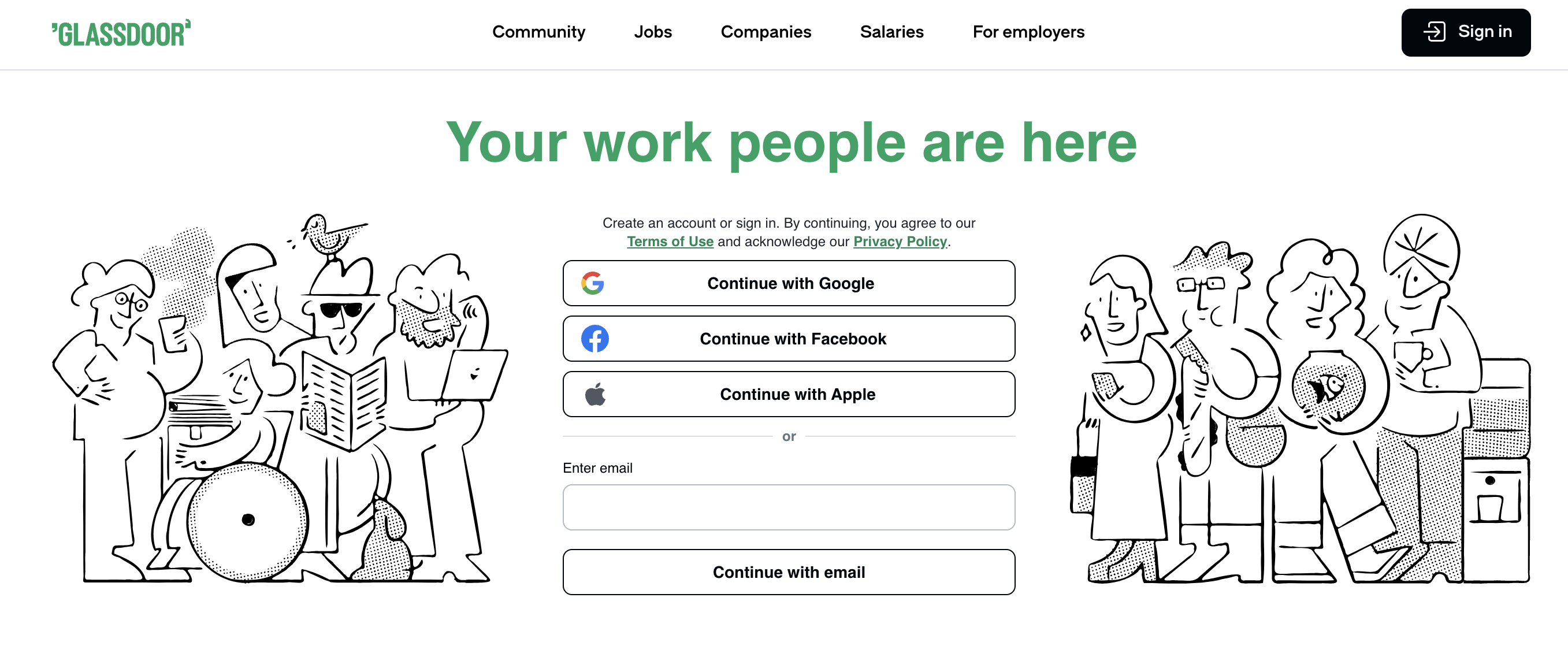
Beyond the initial three platforms, there are several other places to consider when seeking out ETL Developers. Websites like Upwork and Freelancer are excellent for hiring freelancers for short-term projects. If you're targeting remote talent, Remote Tech Jobs is your go-to. For startups, AngelList connects you with candidates who thrive in dynamic environments, whereas platforms like Dice and GitHub Jobs are perfect for tech-specific roles. Finally, for top-quality talent, consider Toptal. These diverse options ensure you can find the right fit for your ETL development needs, regardless of your specific requirements or company culture. For a comprehensive approach to hiring technical talent, you might also explore how to attract the best technical talent.
Keywords to Look for in ETL Developer Resumes
Resume screening is a time-saver when hiring ETL Developers. It helps you quickly identify candidates with the right skills and experience before moving to interviews.
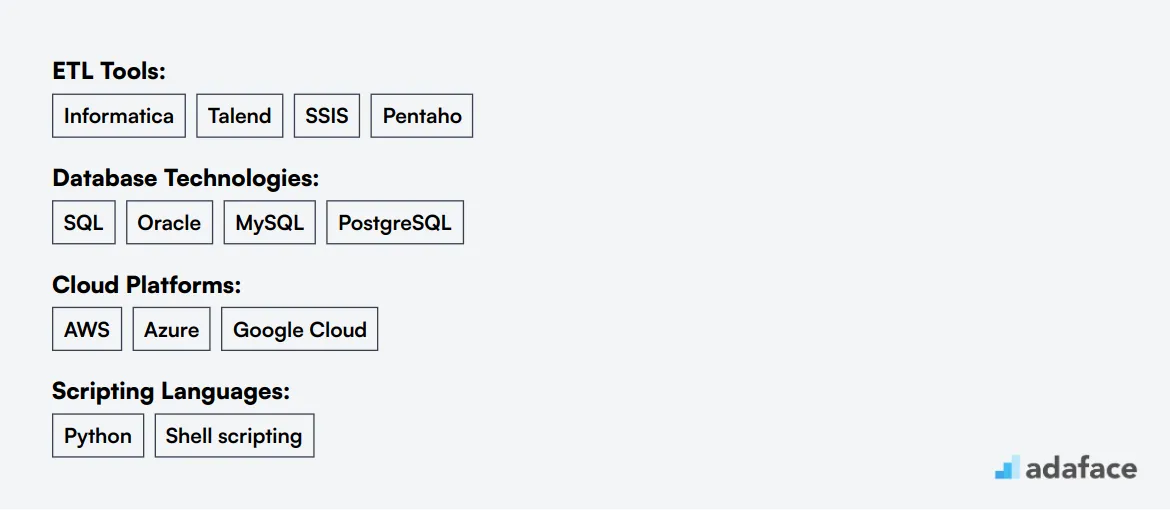
To manually screen resumes, focus on key technical skills like ETL tools, SQL proficiency, and data warehousing experience. Look for mentions of specific tools like Informatica, Talend, or SSIS, and check for years of relevant experience in ETL development.
AI-powered screening can streamline this process further. Use tools like ChatGPT or Claude with a custom prompt that outlines the skills and qualifications you're seeking. This approach can quickly sort through large numbers of resumes.
TASK: Screen resumes for ETL Developer role
INPUT: Resumes
OUTPUT:
- Email
- Name
- Matching keywords
- Score (out of 10)
- Recommendation
- Shortlist (Yes/No/Maybe)
KEYWORDS:
- ETL tools (Informatica, Talend, SSIS)
- SQL (complex queries, optimization)
- Data warehousing (Redshift, Snowflake, BigQuery)
- Programming (Python, Shell scripting)
- Cloud platforms (AWS, Azure, Google Cloud)
- Data modeling and database design
Recommended skills tests for assessing ETL Developers
Skills tests are an effective way to evaluate ETL Developer candidates beyond their resumes. These assessments help you gauge technical proficiency and problem-solving abilities. Here are five key tests we recommend for screening ETL Developer applicants:
ETL skills test: An ETL online test evaluates a candidate's ability to extract, transform, and load data. It assesses their knowledge of ETL processes, tools, and best practices.
SQL skills test: SQL proficiency is fundamental for ETL Developers. This test measures a candidate's ability to write complex queries, manipulate data, and optimize database performance.
Data Warehouse skills test: ETL Developers often work with data warehouses. A Data Warehouse test assesses understanding of warehouse architecture, dimensional modeling, and data integration techniques.
Data Modeling skills test: Effective data modeling is key for ETL processes. This test evaluates a candidate's ability to design logical and physical data models, normalize data, and create entity-relationship diagrams.
Programming skills test: Many ETL tasks require coding. A programming test in languages like Python or Java can assess a candidate's ability to write scripts for data manipulation and automation.
Case Study Assignments to Evaluate ETL Developer Skills
Case study assignments can be valuable for assessing ETL Developer skills, but they come with drawbacks. They're often time-consuming, which can lead to lower completion rates and potentially losing good candidates. However, when used wisely, they offer deep insights into a candidate's abilities.
Data Integration Project: This assignment involves designing and implementing an ETL process to integrate data from multiple sources. Candidates are asked to create a solution that extracts data from various formats, transforms it according to business rules, and loads it into a target database. This case study tests practical ETL development skills and problem-solving abilities.
Data Warehouse Optimization: In this scenario, candidates are presented with an existing data warehouse that needs performance improvements. They're tasked with analyzing the current structure, identifying bottlenecks, and proposing optimizations to enhance query performance and data loading processes. This assignment evaluates a candidate's understanding of data warehouse concepts and optimization techniques.
Real-time Data Processing: This case study focuses on designing a real-time ETL pipeline for streaming data. Candidates are asked to propose an architecture and implement a small-scale solution that can handle continuous data ingestion, transformation, and loading. This assignment is particularly relevant for ETL roles involving big data and real-time analytics.
Structuring the Interview Stage for ETL Developer Candidates
After candidates pass the initial ETL developer skills tests, it's time for technical interviews to assess their hard skills in-depth. While skills tests help filter out unfit candidates, technical interviews are key to finding the best fit for your role. Let's look at some sample interview questions to evaluate ETL developer candidates effectively.
Consider asking: 'Can you explain the ETL process and its importance in data warehousing?' This gauges their understanding of core concepts. 'What ETL tools have you worked with?' helps assess their practical experience. 'How do you handle data quality issues in ETL?' checks their problem-solving skills. 'Can you describe a complex ETL project you've worked on?' evaluates their real-world application of skills. 'How do you optimize ETL processes for large datasets?' tests their ability to work with big data efficiently.
What is the cost of hiring an ETL Developer?
Hiring an ETL Developer can vary widely based on location, experience, and skill set. In the United States, salaries range from $73,920 to $147,201 annually, while in India, the average is around ₹752,739 per year. Understanding these salary ranges will help you make informed and competitive offers.
ETL Developer Salary in the United States
In the United States, the salary for an ETL Developer typically ranges from $73,920 to $147,201 per year, with a median of $104,312. These figures can vary based on location and experience, with cities like Houston offering higher median salaries around $123,578. It's important for recruiters to consider these variations to make competitive offers and attract the right talent.
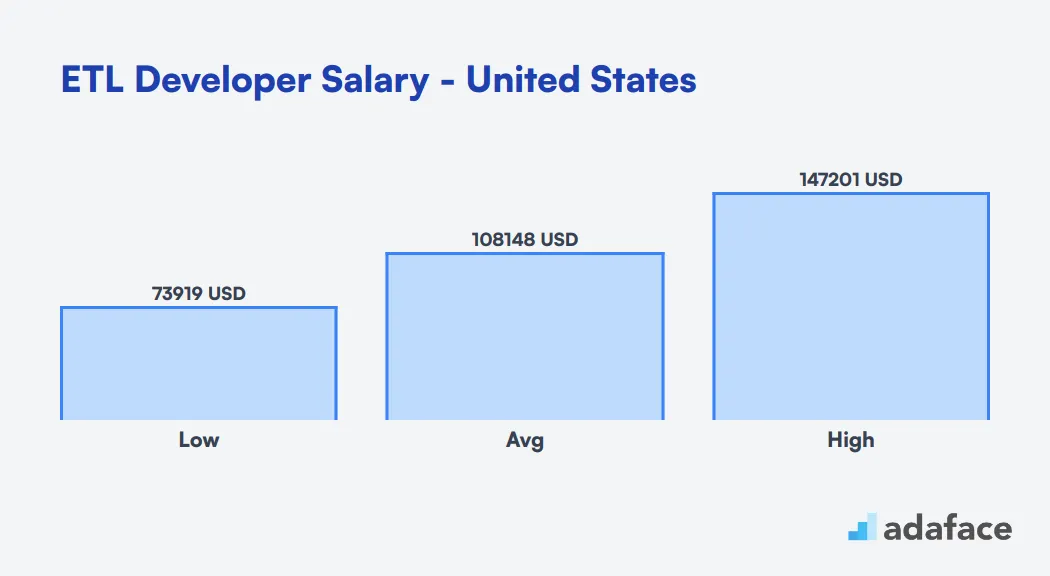
ETL Developer Salary in the United Kingdom
In the United Kingdom, the average salary for an ETL Developer is approximately £40,000 to £65,000 per year. Entry-level positions may start around £30,000, while experienced professionals can command salaries upwards of £80,000, particularly in major cities like London.
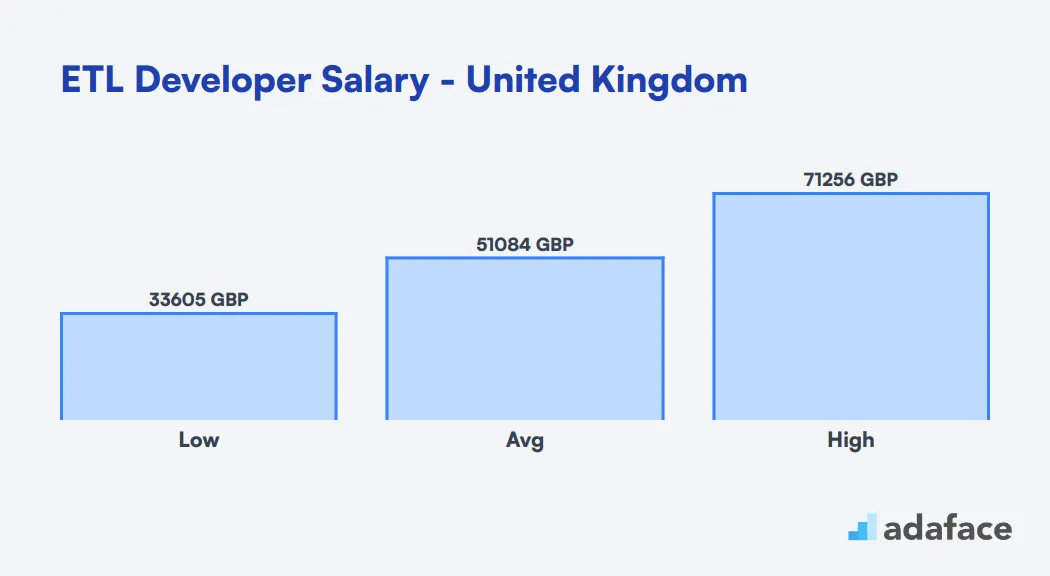
ETL Developer Salary in Australia
ETL Developer salaries in Australia vary across major cities. In Sydney, the average salary is AUD 105,954, while Melbourne offers around AUD 109,500. Canberra tops the list with an average of AUD 163,968.
Nationwide, ETL Developers in Australia can expect a median salary of AUD 102,676. The salary range typically falls between AUD 71,548 and AUD 147,347, depending on experience, skills, and location.
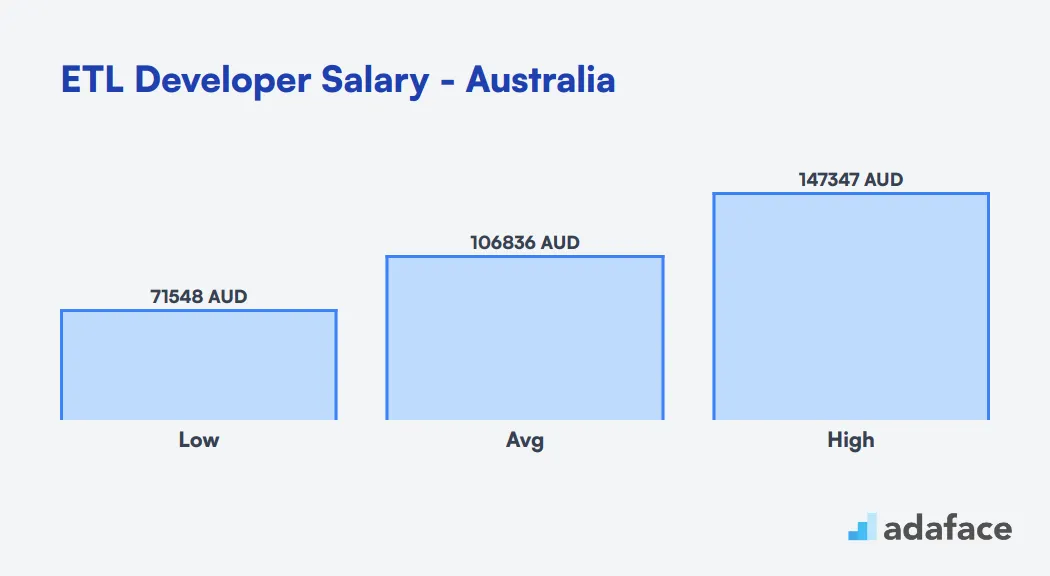
ETL Developer Salary in India
The average salary for an ETL Developer in India is approximately ₹752,739 per annum. Salaries can vary significantly based on location, experience, and skill set, with entry-level positions starting around ₹361,790 and seasoned professionals earning up to ₹1,242,292.
For instance, in metropolitan areas like Mumbai and Delhi, the average salaries reach ₹1,411,472 and ₹1,123,640 respectively. In contrast, cities like Bengaluru and Hyderabad offer average salaries closer to ₹744,563 and ₹703,235.
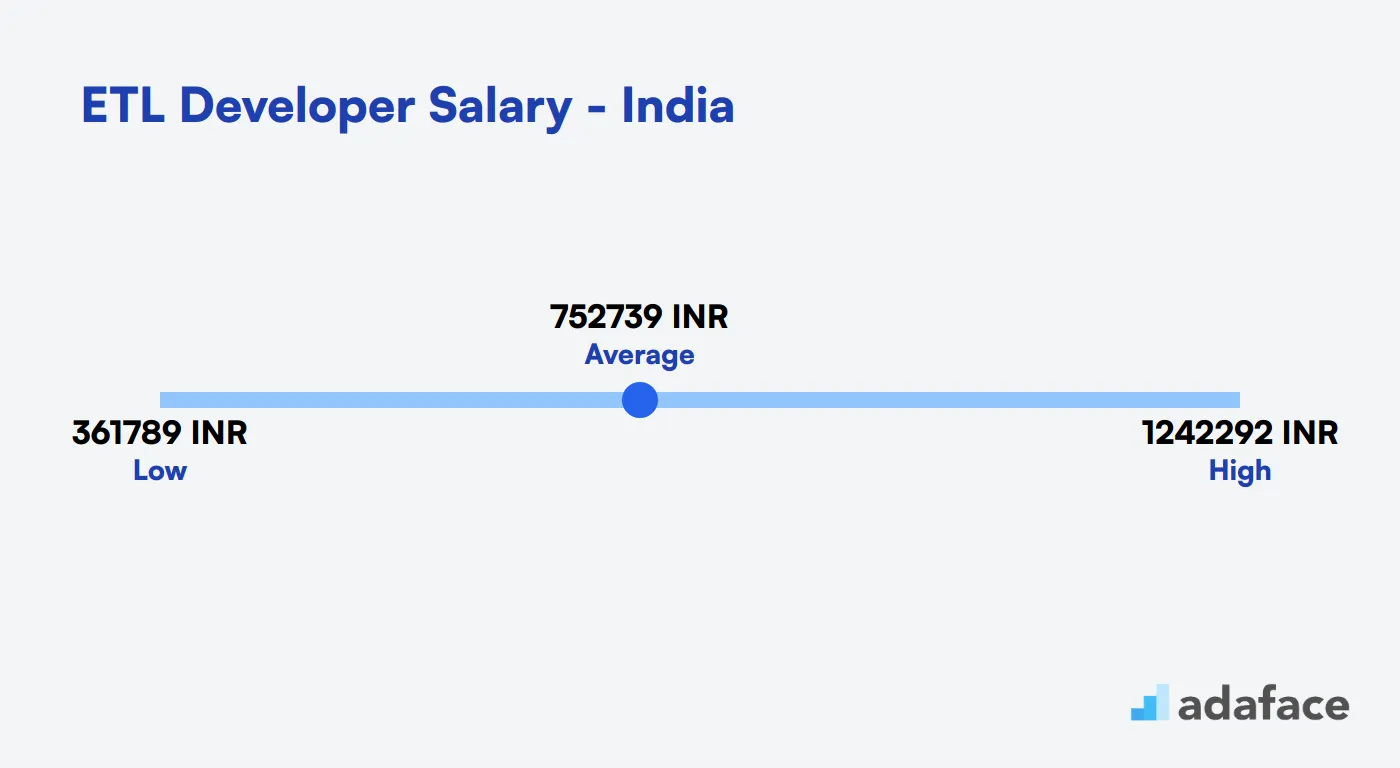
What's the difference between an ETL Developer and a Data Engineer?
At first glance, ETL Developers and Data Engineers might seem quite similar, but their roles focus on different aspects of data management. Understanding these differences can help recruiters hire the right talent for their organization's needs.
An ETL Developer primarily focuses on Extract, Transform, Load (ETL) processes. They work with tools like Informatica, Talend, and SSIS to ensure data is appropriately migrated and integrated. Their primary goal is to manage data cleaning and ETL processes, often requiring proficiency in SQL and Python.
A Data Engineer, on the other hand, is responsible for building and maintaining the data infrastructure. They focus on creating scalable data pipelines and ensuring smooth data storage and access. Their toolkit includes Apache Kafka and Airflow, and they often use programming languages such as Python, Java, and Scala. For more on the skills required, you can explore skills assessment tools.
| ETL Developer | Data Engineer | |
|---|---|---|
| Focus | ETL processes | Data infrastructure |
| Key Skills | ETL tools, SQL | Data architecture, Python |
| Responsibilities | Extract, Transform, Load data | Build data pipelines |
| Tools Used | Informatica, Talend, SSIS | Apache Kafka, Airflow |
| Primary Goal | Data migration, integration | Data storage and access |
| Education Level | Bachelor's Degree | Bachelor's/Master's Degree |
| Programming Languages | SQL, Python | Python, Java, Scala |
| Keywords | Data Cleaning, ETL Processes | Scalability, Data Pipelines |
Hire the Best ETL Developers for Your Team
In this guide, we've covered the ETL Developer hiring process, key skills to look for, crafting effective job descriptions, and where to find top talent. We've also explored resume screening, skills assessment, and interview strategies to help you make informed hiring decisions.
The key takeaway is to use well-crafted job descriptions and skills tests to make your hiring process more accurate. By combining these tools with a structured interview process, you'll be better equipped to identify and hire ETL Developers who can truly add value to your data integration projects.
ETL Assessment Test
FAQs
When hiring an ETL Developer, look for skills in data warehousing, database management, ETL tools, SQL, and strong problem-solving abilities.
An effective job description for an ETL Developer should clearly outline the responsibilities, required skills, and qualifications, including experience with ETL tools and data modeling.
Qualified ETL Developers can be found through job portals, professional networks like LinkedIn, and by working with recruitment agencies that specialize in tech roles.
ETL Developers focus on data extraction, transformation, and loading, while Data Engineers design and manage the infrastructure that supports data processing and storage.
Effective assessment can be done through technical tests, such as our ETL Online Test, and case study assignments that evaluate real-world problem solving.
During an ETL Developer interview, ask questions about their experience with ETL tools, problem-solving scenarios, and how they handle data inconsistencies.
An ETL Developer is important for ensuring that data flows accurately and efficiently across systems, which is crucial for business intelligence and decision-making.

40 min skill tests.
No trick questions.
Accurate shortlisting.
We make it easy for you to find the best candidates in your pipeline with a 40 min skills test.
Try for freeRelated posts
Free resources



